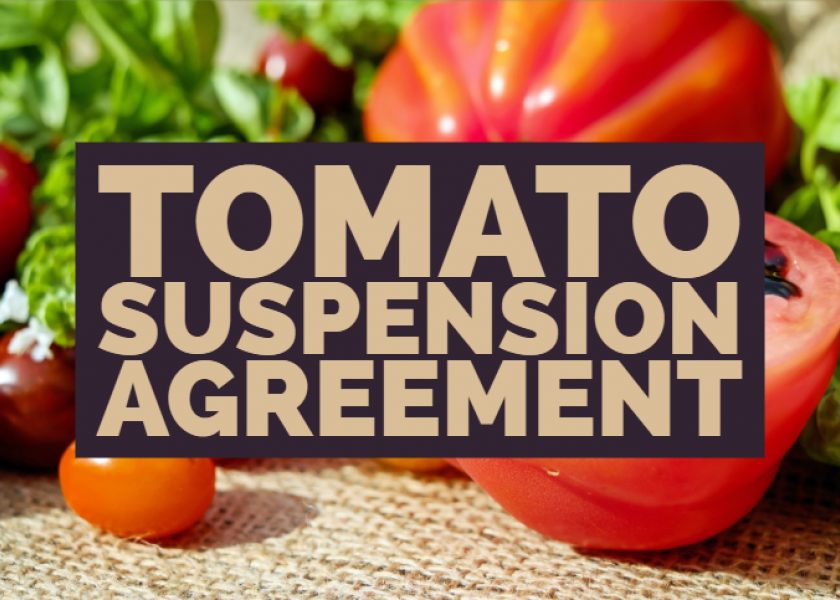Start of inspections on Mexican tomatoes brings worries about delays

Federal and state agencies in Arizona and Texas are gearing up for the start of mandatory U.S. inspections of Mexican tomatoes on April 1, but worries remain about possible bottlenecks for all produce.
The tomato suspension agreement that became effective Sept. 19 between the Commerce Department and Mexican tomato growers mandated U.S. Department of Agriculture inspections of all round and roma tomatoes within 24 hours of an arrival into the U.S. The inspection program was slated to begin six months after the suspension agreement, which ended a dumping investigation on Mexican tomatoes, became effective.
While the target start date of April 1 is a few days beyond six months after the agreement began, the wheels are in motion for inspections — and potential pain points — to begin.
Arizona’s Department of Agriculture has reported the agency has hired or will hire up to 35 inspectors for tomatoes and an additional 60 inspectors for grapes, according to Lance Jungmeyer, president of the Nogales, Ariz.based Fresh Produce Association of the Americas.
Some of that staff will be seasonal, he said, noting grapes, citrus and tomatoes will be active in May and June.
“We are working very closely with the Arizona Department of Agriculture and USDA to plan for the inspections, making sure that warehouses have the information they need to upgrade inspection areas with proper lighting and tables,” Jungmeyer said in a Feb. 13 e-mail. “We are educating the industry about how to be most efficient with the process.”
Jungmeyer praised USDA officials in their work to make the inspections flow well.
Even so, Jungmeyer said FPAA has “serious concerns” about how the tomato inspections will affect service times for importers of citrus, onions, avocados, grapes and other commodities.
“Whereas today an importer could call for and receive an inspection within a few hours for oranges, after tomato inspections start with a service time of ‘normally within 24 hours,’ I foresee that service times for all inspections will be delayed,” he said.
That represents a technical barrier to sellers of other commodities not a part of the suspension agreement with the Commerce Department, he said. That will result in potentially costly delays when f.o.b. markets are moving.
“Over the whole industry, we are looking at hundreds of millions of dollars in business disruption,” he said, noting industry estimates of $220 million in extra costs for additional tomato warehouse space and nearly $50 million in annual costs for the inspection fees and additional warehouse staff to assist with tomato inspections.
Currently, he said, about 15% of Mexican produce coming to the U.S. requires USDA inspection for quality, but that percentage will increase to 29% after tomato inspections begin.
“Is it reasonable to require that nearly one-third of Mexican produce be USDA inspected solely for quality purposes?” Jungmeyer said. “This is not for food safety or public safety. It’s to slow down imports.”
Texas view
There was some optimism in Texas that the start of tomato inspections won’t bring long delays.
The Texas Cooperative Inspection Program, which reports both to the USDA and the Texas Department of Agriculture, has hired 20 additional inspectors specifically for tomatoes and has another 20 on standby if needed for tomato inspections, said Dante Galeazzi, president and CEO of the Texas International Produce Association.
“We have got a lot of personnel dedicated to (the tomato inspections),” Galeazzi said. “We don’t anticipate that there’s going to be any any slowdown or any issues in terms of not having enough inspectors,” he said.
Jason Klinowski, agricultural and food law attorney with Alabama-based Wallace, Jordan, Ratliff & Brandt LLC, said some of his clients are distributors of Mexican produce.
There’s a lot of conversation in the industry that the added inspection staff in Arizona and Texas may not be enough, he said. “The proof is in the pudding. We won’t know until they roll it out.”
Related articles:
Texas meeting covers inspections of imported Mexican tomatoes







